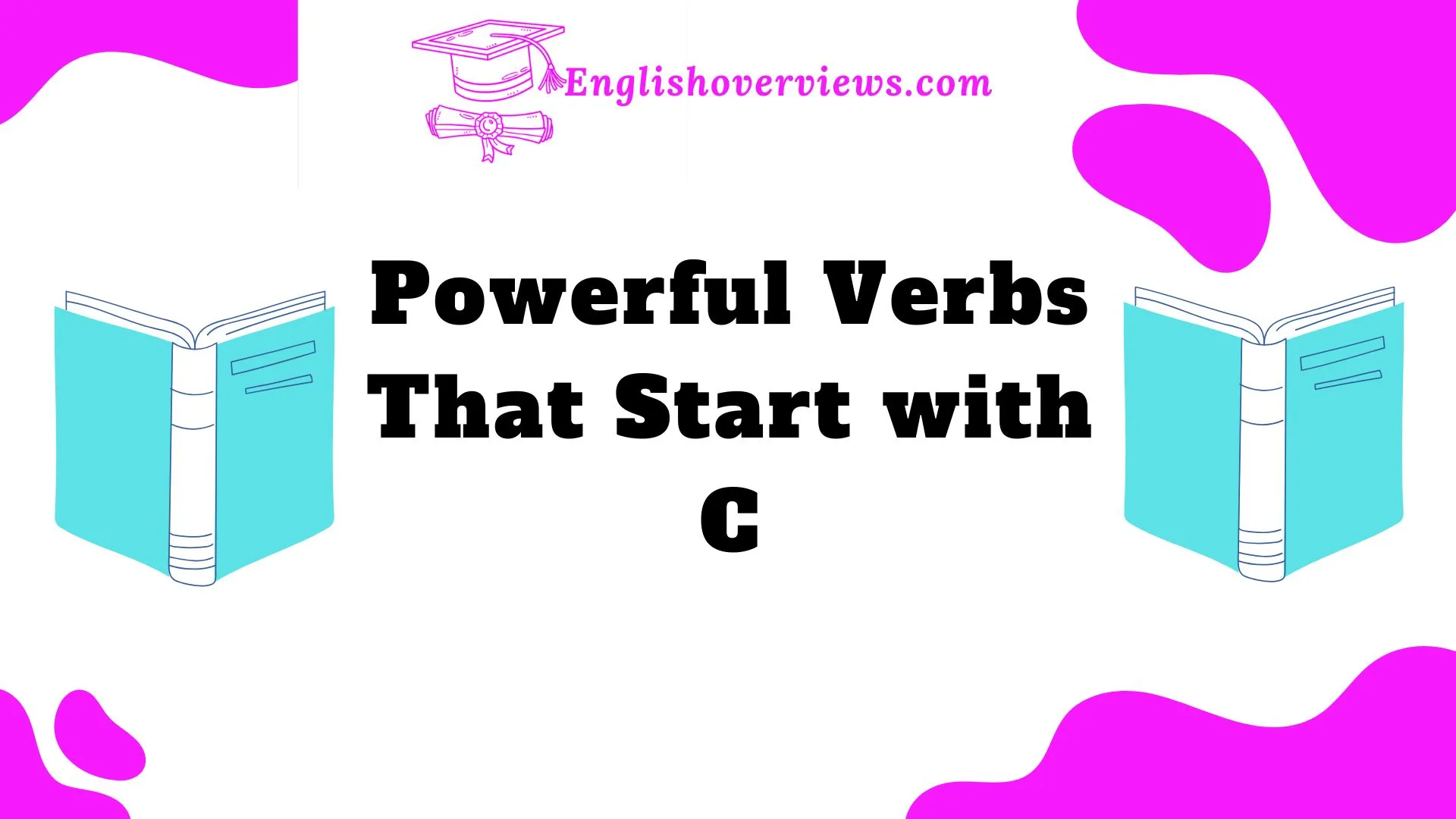When it comes to writing or communication, the words you choose can make all the difference. The right verb can transform a simple sentence into something dynamic and captivating. One letter of the alphabet that packs a punch is C.
Powerful verbs that start with C can help you express actions more vividly and clearly. Whether you’re crafting a persuasive essay, giving a presentation, or just aiming to improve your vocabulary, using strong verbs can elevate your communication.
This blog post will take you on a journey through verbs starting with C exploring their meaning, how they fit into everyday language, and why they matter in both professional and casual settings.
By the end of this guide, you’ll be armed with a powerful toolkit of verbs, ready to make your language more compelling and effective. Ready to dive in? Let’s go!
What is a Verb? A Quick Refresher
Before we get into the exciting world of C verbs, let’s start with a quick refresher on what verbs are and why they’re important in language.
Definition of Verbs
At their core, verbs are words that represent actions, occurrences, or states of being. They describe what’s happening in a sentence, making them essential for communication. Without verbs, sentences would be lifeless and incomplete!
Verbs are essential because they add meaning to your sentences. Whether you’re telling a story, explaining an idea, or describing a process, verbs are the words that show what is happening. For example, in the sentence, “She walked to the store,” walked is the verb because it tells us what the subject (she) is doing.
Types of Verbs
There are different types of verbs, each serving a unique purpose:
- Action Verbs: These verbs describe physical or mental actions. For example, in the sentence, “She climbed the mountain,” climbed is an action verb because it describes what the subject is doing.
- Linking Verbs: These connect the subject of a sentence with more information about it. An example would be, “She is a great teacher.” Here, is connects the subject (she) to the complement (a great teacher).
- Auxiliary Verbs: Also called helping verbs, these are used in conjunction with main verbs to express things like tense, mood, or voice. For instance, in “She can climb the mountain,” can helps the main verb climb to express ability.
- Modal Verbs: These verbs express necessity, ability, permission, or possibility. Examples include can, may, might, and must.
By knowing these different types of verbs, you can better understand their roles in a sentence. Now, let’s focus on those powerful C verbs.
Why Verbs That Start With C Matter
You might be wondering, why focus on verbs that start with C? Well, verbs starting with C are some of the most dynamic and expressive action words you can incorporate into your vocabulary. They help paint clearer pictures and add intensity to your writing.
Impact on Writing and Communication
Imagine you’re telling a story. If you use a weak verb like “did” or “made,” the action can feel flat. But what if you use “create” or “conquer”? Suddenly, the narrative becomes more vibrant and engaging. C verbs are incredibly versatile, from captivating an audience to challenging the status quo, these words can truly amplify the power of your message.
Verbs like conquer and create have a way of making action feel significant. They evoke a sense of accomplishment and potential. Take, for example, conquer. In the sentence, “The team conquered their fears and won the championship,” the word conquered adds depth, implying that the victory was not just about winning but also about overcoming obstacles.
Examples of Powerful C Verbs in Action
- Create: “She created an artwork that left everyone speechless.”
- Conquer: “The team conquered their fears and won the championship.”
- Collaborate: “We need to collaborate if we want to finish this project on time.”
These verbs are more than just action words; they carry a sense of purpose and positivity. They inspire, motivate, and bring people together. Create and conquer are particularly effective in storytelling, while verbs like clarify and celebrate help in communication by making things clearer and more enjoyable.
Positive & Impactful Verbs That Start With the Letter C
Let’s explore a selection of positive, impactful verbs that start with the letter C. These verbs can breathe life into your writing, making it more expressive and action-oriented.
List of Positive C Verbs
| Verb | Definition | Example Sentence |
| Conquer | To defeat or overcome, often in a metaphorical sense | “The team conquered their fears and achieved greatness.” |
| Create | To bring something into existence | “She created a masterpiece that inspired everyone around her.” |
| Clarify | To make something easier to understand | “Can you clarify the instructions for the new task?” |
| Celebrate | To acknowledge or honor something in a joyful way | “Let’s celebrate our hard work with a team dinner.” |
| Collaborate | To work together with others towards a common goal | “We will collaborate with other departments on this project.” |
| Captivate | To attract and hold someone’s attention | “Her performance captivated the audience from start to finish.” |
These verbs are more than just action words; they carry a sense of purpose and positivity. They inspire, motivate, and bring people together. Create and conquer are particularly effective in storytelling, while verbs like clarify and celebrate help in communication by making things clearer and more enjoyable.
Modal Verbs That Start With C
We’ve touched on action verbs, but modal verbs that start with C can also be powerful in expressing ability, necessity, or permission. Let’s break them down.
What Are Modal Verbs?
Modal verbs are auxiliary verbs that modify the meaning of the main verb. They express things like ability, possibility, or permission. Let’s focus on C modal verbs.
Examples of Modal Verbs Starting with C
- Can: “I can help you with that task.”
- Could: “She could improve her performance if she practices more.”
These modal verbs allow speakers to convey their level of ability or willingness. Using can and could adds nuance to sentences, making them sound more natural and human.
Action Words That Start With C
Action words, or verbs of action, are critical in bringing energy to your language. The following C verbs are great for adding dynamism to your writing.
List of C Action Verbs
| Verb | Definition | Example Sentence |
| Chase | To pursue or run after something or someone | “He chased the ball down the field.” |
| Claim | To state or assert something as a right or truth | “She claimed the prize after winning the race.” |
| Climb | To ascend or go up | “We climbed the mountain to watch the sunrise.” |
| Challenge | To confront something with determination or force | “The company challenged the old business model.” |
These action verbs help convey movement, determination, and pursuit. Whether you’re talking about physical activity or striving for a goal, these verbs can bring your sentences to life.
Verbs That Start With C for Everyday Communication
Verbs that start with C aren’t just for formal writing they can also be useful in everyday communication. Let’s take a look at some C verbs that you can use in day-to-day conversations.
Everyday C Verbs
- Call: “I need to call my friend later.”
- Care: “I really care about your opinion.”
- Consider: “Let’s consider the pros and cons before making a decision.”
- Continue: “Please continue with your explanation.”
These verbs are commonly used but still add meaning and clarity to everyday exchanges. By using them strategically, you can make your conversations sound more thoughtful and deliberate.
How Learning Verbs That Start With C Helps in Language Development
For children or language learners, understanding and using a variety of verbs starting with C can be incredibly beneficial.
For Children:
Learning verbs like create, climb, and celebrate can help children expand their vocabulary while making their speech more engaging and dynamic. These verbs not only enhance their vocabulary but also boost their ability to express emotions and actions clearly.
Cognitive Development:
Children who learn action verbs early on tend to have a better grasp of communication skills. Using dynamic verbs helps them understand different actions and concepts, leading to more nuanced and expressive language as they grow.
Frequently Asked Questions (FAQs)
1. What Are Some Common Verbs That Start With C?
- Can, create, climb, celebrate, claim these are just a few examples of commonly used C verbs.
2. How Can I Use Powerful Verbs in My Writing?
- To make your writing more compelling, incorporate strong verbs like conquer, captivate, and create. Use them to show action, describe emotional moments, or add intensity to your narrative.
3. How Do C Verbs Compare to Verbs That Start with Other Letters?
- Verbs that start with C are particularly impactful due to their ability to describe powerful actions and emotions, like conquer or celebrate, which can make a story or argument more compelling than weaker verbs.
4. Are There C Verbs Used More in Business or Academic Writing?
- Yes, verbs like collaborate, clarify, and consider are often used in business and academic writing to express teamwork, explanation, and thoughtfulness.
5. Can Learning Verbs Help Improve My Vocabulary?
- Absolutely! By learning C verbs and understanding their meanings and uses, you’ll not only expand your vocabulary but also improve your ability to communicate more effectively.
Conclusion
Incorporating powerful verbs that start with C into your vocabulary can dramatically enhance your writing and communication. Whether you’re creating a masterpiece, conquering challenges, or simply clarifying your thoughts, these verbs have the power to make your language more vivid and impactful.
Don’t underestimate the power of verbs. They are the backbone of your communication and, when used effectively, they can transform ordinary language into something extraordinary.

English Overviews is a resourceful website dedicated to providing valuable content related to grammar and vocabulary. AD has made notable contributions, sharing insights on various subjects, including WordPress themes and plugins. The primary goal of the site is to help users improve their English language skills effectively.











